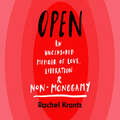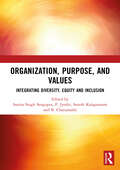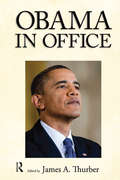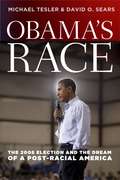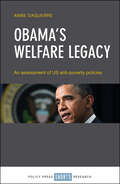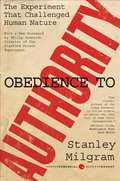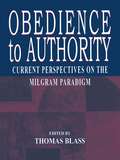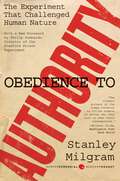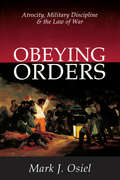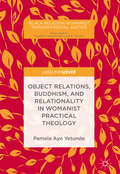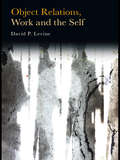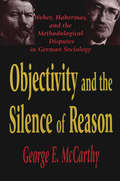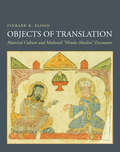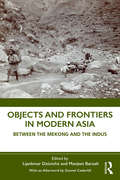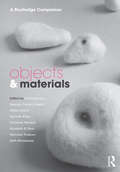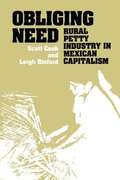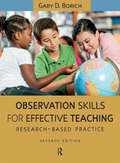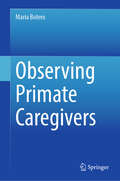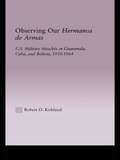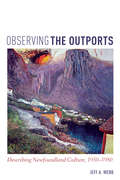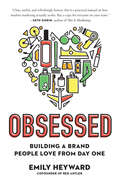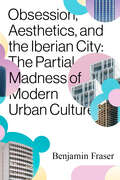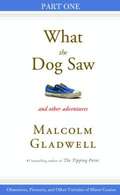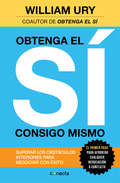- Table View
- List View
OPEN: An Uncensored Memoir of Love, Liberation and Non-Monogamy
by Rachel Krantz*****When Rachel Krantz met and fell for Adam, he told her that he was looking for a committed partnership - just one that did not include exclusivity.Excited but a little trepidatious, Rachel set out to see whether love and a serious relationship can coexist beyond the familiar borders of monogamy. This is her open and honest true story.Now, in her debut memoir, she chronicles her dive into non-monogamy. With fly-on-the-wall detail and extraordinary perceptiveness, OPEN takes us inside Brooklyn parties and into the wider swinger and polyamory community. Armed with her journalistic instincts, detailed journal entries and interviews with experts and therapists, Krantz also breaks new ground in confronting the unique ways tacit abuse and gaslighting can manifest when things get so complex.Unflinching and brazen, OPEN asks what liberation really looks like, and whether the pleasure really is worth the pain.(p) Octopus Publishing Group 2022
ORGANIZATION, PURPOSE, AND VALUES: INTEGRATING DIVERSITY, EQUITY AND INCLUSION
People (employees and investors) are the strength of the organizations and the leader who integrates this understanding creates an environment where people can use their full potential, feel appreciated and grow in the process. Organizations need to promote leadership that is able to nurture the spirit of each employee in order to create happy and harmonious workplaces. Such a nurturing and liberating environment will trigger social energy, which is not only a sufficient condition for innovation but the precondition for creating collective pride.
Obama in Office: The First Two Years
by James A. ThurberBarack Obama entered office on a wave of popular expectation; will he exit at the hands of a Tea Party inspired populist tsunami or return for four more years? Obama in Office brings together well-established political scientists and journalists to offer the first detailed assessment of President Obama and his first two years in office. This book covers the range of policy tests which the administration has faced during this period, including the recession and its jobless recovery, health care reform, financial regulation, the BP oil leak in the Gulf of Mexico, and the ongoing war in Afghanistan. Looking beyond the midterms, Obama in Office considers the results of 2010, the impact of the Tea Party, and the prospects for 2012.
Obama's Race: The 2008 Election and the Dream of a Post-Racial America (Chicago Studies in American Politics)
by Michael Tesler David O. SearsBarack Obama’s presidential victory naturally led people to believe that the United States might finally be moving into a post-racial era. Obama’s Race—and its eye-opening account of the role played by race in the election—paints a dramatically different picture. The authors argue that the 2008 election was more polarized by racial attitudes than any other presidential election on record—and perhaps more significantly, that there were two sides to this racialization: resentful opposition to and racially liberal support for Obama. As Obama’s campaign was given a boost in the primaries from racial liberals that extended well beyond that usually offered to ideologically similar white candidates, Hillary Clinton lost much of her longstanding support and instead became the preferred candidate of Democratic racial conservatives. Time and again, voters’ racial predispositions trumped their ideological preferences as John McCain—seldom described as conservative in matters of race—became the darling of racial conservatives from both parties. Hard-hitting and sure to be controversial, Obama’s Race will be both praised and criticized—but certainly not ignored.
Obama’s Welfare Legacy: An Assessment of US Anti-Poverty Policies
by Anne DaguerreThe election of Barack Obama in the midst of the 2008 economic downturn brought hope to millions and presented an opportunity for expanding socio-economic rights. But the Obama administration was consistently constrained by the challenges of divided government, and the now threatened Affordable Care Act (‘Obamacare’) remains the stand-out welfare reform of his Presidency. Using new research, Anne Daguerre examines Obama’s legacy on welfare and antipoverty policies, focusing in particular on the Temporary Assistance for Needy Families (TANF) and the Supplemental Nutrition Assistance Program (SNAP). The book provides an up-to-date account of the contemporary politics of poverty and public entitlements in the US, comparing this with the Western European experience and its traditionally strong commitment to social welfare, to assess what lessons can be learned.
Obedience to Authority: An Experimental View
by Stanley MilgramThis book presents Milgram's fascinating and troubling chronicle of his classic study and a vivid and persuasive explanation of his conclusions.
Obedience to Authority: Current Perspectives on the Milgram Paradigm
by Thomas BlassStanley Milgram's experiments on obedience to authority are among the most important psychological studies of this century. Perhaps because of the enduring significance of the findings--the surprising ease with which ordinary persons can be commanded to act destructively against an innocent individual by a legitimate authority--it continues to claim the attention of psychologists and other social scientists, as well as the general public. The study continues to inspire valuable research and analysis. The goal of this book is to present current work inspired by the obedience paradigm. This book demonstrates the vibrancy of the obedience paradigm by presenting some of its most important and stimulating contemporary uses and applications. Paralleling Milgram's own eclecticism in the content and style of his research and writing, the contributions comprise a potpourri of styles of research and presentation--ranging from personal narratives, through conceptual analyses, to randomized experiments.
Obedience to Authority: The Experiment That Challenged Human Nature
by Stanley MilgramA part of Harper Perennial’s special “Resistance Library” highlighting classic works that illuminate our times: A special edition reissue of Stanley Milgram’s landmark examination of humanity’s susceptibility to authoritarianism.“The classic account of the human tendency to follow orders, no matter who they hurt or what their consequences.” — Washington Post Book WorldIn the 1960s, Yale University psychologist Stanley Milgram famously carried out a series of experiments that forever changed our perceptions of morality and free will. The subjects—or “teachers”—were instructed to administer electroshocks to a human “learner,” with the shocks becoming progressively more powerful and painful. Controversial but now strongly vindicated by the scientific community, these experiments attempted to determine to what extent people will obey orders from authority figures regardless of consequences. “Milgram’s experiments on obedience have made us more aware of the dangers of uncritically accepting authority,” wrote Peter Singer in the New York Times Book Review. With an introduction from Dr. Philip Zimbardo, who conducted the famous Stanford Prison Experiment, Obedience to Authority is Milgram’s fascinating and troubling chronicle of his classic study and a vivid and persuasive explanation of his conclusions.
Obeying Orders: Atrocity, Military Discipline and the Law of War
by Mark J. OsielA soldier obeys illegal orders, thinking them lawful. When should we excuse his misconduct as based in reasonable error? How can courts convincingly convict the soldier's superior officer when, after Nuremberg, criminal orders are expressed through winks and nods, hints and insinuations? Can our notions of the soldier's "due obedience," designed for the Roman legionnaire, be brought into closer harmony with current understandings of military conflict in the contemporary world? Mark J. Osiel answers these questions in light of new learning about atrocity and combat cohesion, as well as changes in warfare and the nature of military conflict. Sources of atrocity are far more varied than current law assumes, and such variations display consistent patterns. The law now generally requires that soldiers resolve all doubts about the legality of a superior's order in favor of obedience. It excuses compliance with an illegal order unless the illegality - as with flagrant atrocities - would be immediately obvious to anyone. But these criteria are often in conflict and at odds with the law's underlying principles and policies. Combat and peace operations now depend more on tactical imagination, self-discipline, and loyalty to immediate comrades than on immediate, unreflective adherence to the letter of superiors' orders, backed by threat of formal punishment. The objective of military law is to encourage deliberative judgment. This can be done, Osiel suggests, in ways that enhance the accountability of our military forces, in both peace operations and more traditional conflicts, while maintaining their effectiveness. Osiel seeks to "civilianize" military law while building on soldiers' own internal ideals of professional virtuousness. He returns to the ancient ideal of martial honor, reinterpreting it in light of new conditions, arguing that it should be implemented through realistic training in which legal counsel plays an enlarged role rather than by threat of legal prosecution. Obeying Orders thus offers a compelling answer to the question that has most haunted the moral imagination of the late twentieth century: the roots - and restraint - of mass atrocity in war.
Object Relations, Buddhism, and Relationality in Womanist Practical Theology (Black Religion/Womanist Thought/Social Justice)
by Pamela Ayo YetundeThis book establishes how Buddhism in the Insight Meditation tradition supports “remarkable relational resilience” for women who are of African descent and same-sex loving, yet living in a society that often invalidates women, African-Americans, LGBTQ people, and non-Christians. Pamela Ayo Yetunde explores the psycho-sexual experiences of African-American Buddhist lesbians, and shows that their abilities to be in healthy relationships are made possible through their Buddhist practices and communities, even in the face of invisibilizing forces related to racial, gender, sexuality, and religious discrimination and oppression.
Object Relations, Work and the Self
by David P. LevineIn this book, David P. Levine applies psychoanalytic object relations theory to understanding work motivation and the meaning of work. Drawing on the writings of authors such as Donald Winnicott, Otto Kernberg and Melanie Klein, he explores three factors central to our effort to understand work: guilt, greed and the self. Special attention is paid to the factors that determine the individual’s emotional capacity to do work that engages the self and its creative potential and to the related matter of impairment in that capacity. Chapters include: the problem of work greed, envy and the search for the self skill, power and authority work and reality. Object Relations, Work and the Self will be of interest to psychoanalysts and organizational consultants as well as anyone concerned with what determines the quality of life in the workplace.
Objectivity and the Silence of Reason: Weber, Habermas and the Methodological Disputes in German Sociology
by George McCarthyIssues important to the philosophy of social science are widely discussed in the American academy today. Some social scientists resist the very idea of a debate on general issues. They continue to focus on behaviorist and positivist criteria, and the concepts, methods, and theories appropriate to a particular and narrow form of scientific inquiry. McCarthy argues that a new and valuable perspective may be gained on these questions through a return to philosophical debates surrounding the origins and development of nineteenth- and twentieth-century German sociology. In Objectivity and the Silence of Reason he focuses on two key figures, Max Weber and Jurrgen Habermas, reopening the vibrant and rich intellectual dispute about knowledge and truth in epistemology and concept formation, logic of analysis, and methodology in the social sciences. He uses this debate to explore the forms of objectivity in everyday experience and science, and the relations between science, ethics, and politics.McCarthy analyzes the tension in Weber's work between his early methodological writings with their emphasis on interpretive science, subjective intentionality, cultural and historical meaning and the later works that emphasize issues of explanatory science, natural causality, social prediction, and nomological law. While arguing for a value-free science, Weber was highly critical of the disenchanted and meaningless world of technical reason and rejected positivist objectivity. McCarthy shows how Habermas attempted to resolve tensions in Weber's work by clarifying the relationship between the methods of subjective interpretation and objective causality. Habermas believes that social science cannot be silent in the face of alienation, false consciousness, and the oppression of technological and administrative rationality and must adopt methodologies connected to the broader ethical and political questions of the day.Drawing deeply on the Kantian and neo-Kantian tradition that contributed to the development of Weber's method, Objectivity and the Silence of Reason demonstrates the crucial integration of philosophy and sociology in German intellectual culture. It elucidates the complexities of the development of modern social science. The book will be of interest to sociologists, philosophers, and intellectual historians.
Objects Of Translation: Material Culture And Medieval Hindu-Muslim Encounter
by Finbarr B. FloodObjects of Translation offers a nuanced approach to the entanglements of medieval elites in the regions that today comprise Afghanistan, Pakistan, and north India. The book--which ranges in time from the early eighth to the early thirteenth centuries--challenges existing narratives that cast the period as one of enduring hostility between monolithic "Hindu" and "Muslim" cultures. These narratives of conflict have generally depended upon premodern texts for their understanding of the past. By contrast, this book considers the role of material culture and highlights how objects such as coins, dress, monuments, paintings, and sculptures mediated diverse modes of encounter during a critical but neglected period in South Asian history. The book explores modes of circulation--among them looting, gifting, and trade--through which artisans and artifacts traveled, remapping cultural boundaries usually imagined as stable and static. It analyzes the relationship between mobility and practices of cultural translation, and the role of both in the emergence of complex transcultural identities. Among the subjects discussed are the rendering of Arabic sacred texts in Sanskrit on Indian coins, the adoption of Turko-Persian dress by Buddhist rulers, the work of Indian stone masons in Afghanistan, and the incorporation of carvings from Hindu and Jain temples in early Indian mosques. Objects of Translation draws upon contemporary theories of cosmopolitanism and globalization to argue for radically new approaches to the cultural geography of premodern South Asia and the Islamic world.
Objects and Frontiers in Modern Asia: Between the Mekong and the Indus
by Lipokmar Dzüvichü Manjeet BaruahFocusing on the geographies between the Mekong and the Indus, this book brings objects to the centre of enquiry in the understanding of modern Asian frontiers. It explores how a range of objects have historically been significant bearers and agents of frontier making. For instance, how are objects connected to aspects of state making, social change, everyday life, diplomacy, political and ecological worlds, capital, forms of violence, resistances, circulations, and aesthetic expressions? This book seeks to interrogate and understand the dynamism of frontiers from the vantage point of objects such as salt, rubber, tea, guns, silk scarves, horses, and opium. It attempts to explore objects as sites of encounter, mediation, or dislocation between the social and the spatial. The book not only locates objects in the specificities of frontier spaces, but it also looks at how they are produced, circulated, and come to be intricately linked to a wide range of people, institutions, networks, and geographies. In the process, it explores how objects traverse and come to inhabit multiple historical, cultural, and geographical scales. This book will be of interest to researchers and academics working in areas of history, social and cultural anthropology, Asian studies, frontiers and borderland studies, cultural studies, political and economic studies, and museum studies.
Objects and Materials: A Routledge Companion (CRESC)
by Eleanor Conlin Casella Kath Woodward Hannah Knox Penny Harvey Gillian Evans Nicholas Thoburn Elizabeth B. Silva Christine McLeanThere is broad acceptance across the Humanities and Social Sciences that our deliberations on the social need to take place through attention to practice, to object-mediated relations, to non-human agency and to the affective dimensions of human sociality. This Companion focuses on the objects and materials found at centre stage, and asks: what matters about objects? Objects and Materials explores the field, providing succinct summary accounts of contemporary scholarship, along with a wealth of new research investigating the capacity of objects to shape, unsettle and exceed expectations. Original chapters from over forty international, interdisciplinary contributors address an array of objects and materials to ask what the terms of collaborations with objects and materials are, and to consider how these collaborations become integral to our understandings of the complex, relational dynamics that fashion social worlds. Objects and Materials will be of interest to students and scholars across the social sciences and humanities, including in sociology, social theory, science and technology studies, history, anthropology, archaeology, gender studies, women’s studies, geography, cultural studies, politics and international relations, and philosophy.
Obliging Need: Rural Petty Industry in Mexican Capitalism
by Leigh Binford Scott CookFor centuries throughout large portions of the globe, petty agriculturalists and industrialists have set their physical and mental energies to work producing products for direct consumption by their households and for exchange. This twofold household reproduction strategy, according to both Marxist and neoclassical approaches to development, should have disappeared from the global economy as labor was transformed into a producer as well as a consumer of capitalist commodities. But in fact, during the twentieth century, only the United States and Britain seem to have approximated this predicted scenario. Tens of millions of households in contemporary Asia, Africa, and Latin America and millions more in industrialized capitalist economies support themselves through petty commodity production alone or in combination with petty industry wage labor. Obliging Need provides a detailed and comprehensive analysis of small-scale peasant and artisan enterprise in the Oaxaca Valley of Mexico. The authors show how commodity production is organized and operates in different craft industries, as well as the ways in which it combines with other activities such as household chores, agriculture, wage labor, and petty commerce. They demonstrate how--contrary to developmentalist dogma--small-scale capitalism develops from within Mexico's rural economy. These findings will be important for everyone concerned with improving the lives and economic opportunities of countryfolk in the Third World. As the authors make clear, political mobilization in rural Mexico will succeed only as it addresses the direct producers' multiple needs for land, credit, more jobs, health insurance, and, most importantly, more equitable remuneration for their labor and greater rewards for their enterprise. For centuries throughout large portions of the globe, petty agriculturalists and industrialists have set their physical and mental energies to work producing products for direct consumption by their households and for exchange. This twofold household reproduction strategy, according to both Marxist and neoclassical approaches to development, should have disappeared from the global economy as labor was transformed into a producer as well as a consumer of capitalist commodities. But in fact, during the twentieth century, only the United States and Britain seem to have approximated this predicted scenario. Tens of millions of households in contemporary Asia, Africa, and Latin America and millions more in industrialized capitalist economies support themselves through petty commodity production alone or in combination with petty industry wage labor. Obliging Need provides a detailed and comprehensive analysis of small-scale peasant and artisan enterprise in the Oaxaca Valley of Mexico. The authors show how commodity production is organized and operates in different craft industries, as well as the ways in which it combines with other activities such as household chores, agriculture, wage labor, and petty commerce. They demonstrate how--contrary to developmentalist dogma--small-scale capitalism develops from within Mexico's rural economy. These findings will be important for everyone concerned with improving the lives and economic opportunities of countryfolk in the Third World. As the authors make clear, political mobilization in rural Mexico will succeed only as it addresses the direct producers' multiple needs for land, credit, more jobs, health insurance, and, most importantly, more equitable remuneration for their labor and greater rewards for their enterprise.
Observation Skills for Effective Teaching: Research-Based Practice
by Gary D. BorichThoroughly updated for the new era of Common Core Standards, this seventh edition of Observational Skills for Effective Teaching is vital in this time of educational change. It offers a detailed, yet easily accessible, handbook for teachers to prepare for and design their first classroom experiences. Updated with the newest research on effective teaching and learning, the book cogently introduces such topics as learning climate, classroom management, and lesson clarity with the newest findings that lead to desirable cognitive, social, and emotional outcomes in learners.
Observing Primate Caregivers
by Maria BoteroThis book aims to advance our understanding of the caregiver-infant interaction in primates and its effect on the development of social cognition, working from an interdisciplinary approach (i.e., psychology, philosophy, and anthropology), challenging the dominant cognitivist perspectives and methodologies. This book is important because it contributes to understanding how primate parent-and-infant interaction works and how it affects the infant’s development. Understanding this parent-and-infant interaction contributes to finding better ways to support human parents and provide better care for non-human primate mothers and infants in captivity.
Observing our Hermanos de Armas: U.S. Military Attaches in Guatemala, Cuba and Bolivia, 1950-1964
by Robert O. KirklandThis study analyzes the effectiveness of the U.S. military attaché corps in Latin America from the end of World War II to the Johnson administration.
Observing the Outports
by Jeff WebbThe years after Newfoundland's confederation with Canada were ones of rapid social and economic change, as provincial resettlement and industrialization initiatives attempted to transform the lives of rural Newfoundlanders. At Memorial University in St. John's, a new generation of faculty saw the province's transformation as a critical moment. Some hoped to solve the challenges of modernization through their rural research. Others hoped to document the island's "traditional" culture before it disappeared. Between them they created the field of "Newfoundland studies."In Observing the Outports, Jeff A. Webb illustrates how interdisciplinary collaborations among scholars of lexicography, history, folklore, anthropology, sociology, and geography laid the foundation of our understanding of Newfoundland society in an era of modernization. His extensive archival research and oral history interviews illuminate how scholars at Memorial University created an intellectual movement that paralleled the province's cultural revival.
Obsessed: Building a Brand People Love from Day One
by Emily HeywardThe cofounder and chief branding officer of Red Antler, the branding and marketing company for startups and new ventures, explains how hot new brands like Casper, Allbirds, Sweetgreen, and Everlane build devoted fan followings right out of the gate.We're in the midst of a startup revolution, with new brands popping up every day, taking over our Instagram feeds and vying for our affection. Every category is up for grabs, and traditional brands are seeing their businesses erode as hundreds of small companies encroach on their territory, each hoping to become the next runaway success. But it's not enough to have a great idea, or a cool logo. Emily Heyward founded Red Antler, the Brooklyn based brand and marketing company, to help entrepreneurs embed brand as a driver of business success from the beginning. In Obsessed, Heyward outlines the new principles of what it takes to build and launch a brand that has people queuing up to buy it on opening day. She takes you behind the scenes of the creation of some of today's hottest new brands, showing you: • How Casper was able to upend the mattress industry by building a beloved brand where none had existed before • How the dating app Hinge won a fanatical user base and great word-of-mouth with the promise that the app was "designed to be deleted" • Why luggage startup Away, now valued at $1.4 billion, could build their brand around love of travel by launching with just one product--a hard-shell carry-on suitcase--rather than a whole range of luggage offerings.Whether you're starting a new business, launching a new product line, or looking to refresh a brand for a new generation of customers, Obsessed shows you why the old rules of brand-building no longer apply, and what really works for today's customers.
Obsession, Aesthetics, and the Iberian City: The Partial Madness of Modern Urban Culture
by Benjamin FraserAlthough many depictions of the city in prose, poetry, and visual art can be found dating from earlier periods in human history, Obsession, Aesthetics, and the Iberian City emphasizes a particular phase in urban development. This is the quintessentially modern city that comes into being in the nineteenth century. In social terms, this nineteenth-century city is the product of a specialist class of planners engaged in what urban theorist Henri Lefebvre has called the bourgeois science of modern urbanism. One thinks first of the large scale and the wide boulevards of Baron Georges von Haussmann&’s Paris or the geometrical planning vision of Ildefons Cerdà&’s Barcelona. The modern science of urban design famously inaugurates a new way of thinking the city; urban modernity is now defined by the triumph of exchange value over use value, and the lived city is eclipsed by the planned city as it is envisioned by capitalists, builders, and speculators. Thus urban plans, architecture, literary prose and poetry, documentary cinema and fiction film, and comics art serve as windows into our modern obsession with urban aesthetics. This book investigates the social relationships implied in our urban modernity by concentrating on four cities that are in broad strokes representative of the cultural and linguistic heterogeneity of the Iberian peninsula. Each chapter introduces but moves well beyond an identifiable urban area in a given city, noting the cultural obsession implicit in its reconstruction as well as the role of obsession in its artistic representation of the urban environment. These areas are Barcelona&’s Eixample district, Madrid&’s Linear City, Lisbon&’s central Baixa area, and Bilbao&’s Seven Streets, or Zazpikaleak. The theme of obsession—which as explored is synonymous with the concept of partial madness—provides a point of departure for understanding the interconnection of both urbanistic and artistic discourses.
Obsessives, Pioneers, and Other Varieties of Minor Genius: Part One from What the Dog Saw
by Malcolm GladwellWhat is the difference between choking and panicking? Why are there dozens of varieties of mustard-but only one variety of ketchup? What do football players teach us about how to hire teachers? What does hair dye tell us about the history of the 20 th century? In the past decade, Malcolm Gladwell has written three books that have radically changed how we understand our world and ourselves:The Tipping Point;Blink; andOutliers.Now, inWhat the Dog Saw, he brings together, for the first time, the best of his writing fromTheNew Yorkerover the same period. Here is the bittersweet tale of the inventor of the birth control pill, and the dazzling inventions of the pasta sauce pioneer Howard Moscowitz. Gladwell sits with Ron Popeil, the king of the American kitchen, as he sells rotisserie ovens, and divines the secrets of Cesar Millan, the "dog whisperer" who can calm savage animals with the touch of his hand. He explores intelligence tests and ethnic profiling and "hindsight bias" and why it was that everyone in Silicon Valley once tripped over themselves to hire the same college graduate. "Good writing," Gladwell says in his preface, "does not succeed or fail on the strength of its ability to persuade. It succeeds or fails on the strength of its ability to engage you, to make you think, to give you a glimpse into someone else's head."What the Dog Sawis yet another example of the buoyant spirit and unflagging curiosity that have made Malcolm Gladwell our most brilliant investigator of the hidden extraordinary.
Obstinate Hebrews: Representations of Jews in France, 1715-1815
by Ronald SchechterA path-breaking study of the Jews in France from the time of the philosophies through the Revolution and up to Napoleon. Examines how Jews were thought of during this time, by both French writers and the Jews themselves.
Obtenga el sí consigo mismo: Superar los obstáculos interiores para negociar con éxito
by William UryEl primer paso para afrontar cualquier negociación o conflicto. William Ury, coautor del clásico best seller Obtenga el sí, ha enseñado a decenas de miles de personas de todos los ámbitos profesionales cómo mejorar su capacidad de negociación. A lo largo de estos años, Ury ha descubierto que el mayor obstáculo para alcanzar unos acuerdos provechosos y unas relaciones satisfactorias no está en nuestra contraparte, por difícil que esta resulte. El mayor obstáculo reside en nosotros mismos, en nuestra tendencia natural a reaccionar de una forma contraria a nuestros intereses. Sin embargo, este obstáculo se puede convertir en nuestro mejor aliado. Si aprendemos primero a comprendernos y a controlarnos, estamos poniendo la base para comprender e influenciar a los demás. En esta precuela indispensable de Obtenga el sí, Ury parte de su experiencia personal y profesional como negociador en conflictos bélicos paradesarrollar un método práctico que permite conquistar primero el sí con uno mismo, e incrementar de esta forma la capacidad para conseguir el sí de los demás. Útil y sencillo, Obtenga el sí consigo mismo es una guía esencial para alcanzar la satisfacción interior, a partir de la cual podrá mantener unas relaciones más sanas, una familia más feliz, un trabajo más productivo y un entorno más pacífico. Reseñas:«Inteligente y realista, noble y práctico, brillante y cercano. Ury ha desarrollado un planteamiento global para alcanzar el sí en un mundo tan conflictivo como el nuestro. Este libro se centra en la negociación más dura de todas: la que hacemos con nosotros mismos. Una vez más, Ury ha realizado una gran contribución con su trabajo.»Jim Collins, autor de Empresas que sobresalen «He aquí nuestro peor enemigo en cualquier mesa de negociación: nosotros mismos. Ury ha escrito una imprescindible precuela de Consiga el sí. Si usted adopta las estrategias de este libro conseguirá avanzar en su vida y en su carrera.»Daniel H. Pink, autor de La sorprendente verdad sobre qué nos motiva «Ury nos ofrece un planteamiento que refuerza nuestra confianza y que nos aporta una sensación de energía y realización personal. Todos seremos más eficaces si empezamos las negociaciones por nosotros mismos antes que con los demás.»Joanna Barsh, directora emérita de McKinsey & Company
